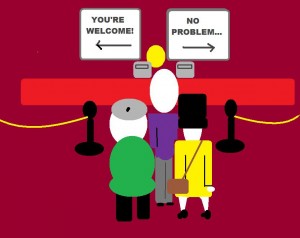“No Problem….” Is a Problem
“I welcome him like I welcome cold sores.”—Paula Abdul (speaking of American Idol’s Simon Cowell)
“Welcome to President Bush, Mrs. Bush, and my fellow astronauts.”—former Vice President, Dan Quayle, who was not an astronaut

CHOICES/Image: Michael Moffa
One gauge of the state of manners and civility in modern professional and personal life is the ritualized expressions —both verbal and non-verbal—that characterize our interactions. The triumph of the expression “no problem” over “you’re welcome” is one such barometer of our changing social and (un)civil climate. As such, it constitutes a warning of social clouds overhead.
Ask Your Grandmother
There once was a time when if someone said, “Thank you”, the natural and virtually universal reply would have been “you’re welcome.” Check with your grandmother to confirm this. In the highest-levels of professional or formal interaction, this is probably still the norm. Likewise, among non-native English speakers, who generally learn the most polite English from their formally-trained instructors, “you’re welcome” prevails, despite their fondness for the too casual “gonna” (“going to”).
But ask yourself whether your typical response or the one you hear most often among recruiters, between recruiters and candidates or between recruiter and client is “you’re welcome”, or “no problem”.
In all likelihood, quite accustomed to saying or hearing “no problem”, most people won’t give it a first or second thought. It’s as natural as “put a shrimp on the barbie, mate” is in Australia—even if “no prawblem” conceivably may have not originated there.
You enter any shop or store, you pay for your purchase and say, “Thank you”. If the assistant, clerk or Star Buck’s barista is under 40 (as they all seem to be at any Star Bucks I’ve been in around the world), it is as predictable as saggy pants on a rapper that you’ll hear “no problem” in response.
The problem with “no problem” is that it is absolutely the wrong thing to say—including for recruiters.
The Problem with “No Problem”
What’s wrong with it is that it distorts “thank you” into “I’m sorry”. Think about it: “Thank you!”—“No problem; you didn’t cause me any or much trouble or inconvenience.” (Giving you my money inconvenienced you?) Or, “No problem; just don’t do it again.” (Don’t buy another Super Mocha Grande?) Or, “No problem; it wasn’t important, anyway.” (Ah, my business is unimportant?) Or, “No problem; no big deal for me.” (My patronage doesn’t matter?)—the latter being subtly different from “It wasn’t important, anyway.” These are not responses to expressions of appreciation. They are responses to an apology for wrongdoing.
Now, imagine saying “no problem” to a client who has just said “thank you” for your candidate search and recommendations. If you are younger, rather than older, you may be at risk of saying “no problem” as a reflex, like “I’m like….”, since it’s part of the MTVocabulary (not to be confused with “empty vocabulary”…or at least not by anyone who speaks MTV).
Whenever I elicit a “no problem”, I cringe and think, “I’m sorry, but did I just apologize to you, instead of thanking you?” If I do say, “I’m sorry, but did I just apologize to you?”, then “no problem” ironically becomes the appropriate reply to me, since, indeed, I will have just expressed a real apology at that moment (for having confused “thanks” with “I’m sorry”). My bad.
Of course, “no problem” is supposed to be casual, non-formal, just as “it’s OK” is. The problem with this equivalence is that “it’s OK” should also be used only in response to an apology. “I’m sorry I’m late.”—“No problem/It’s OK.” Besides, why should being casual legitimize such a mismatch of remark and reply?
The Problems of Illogic and Being Ill-Mannered
Perhaps the evolution of such an accusatory acknowledgement as “no problem” is the result of flawed MTV logic: “Casual is good. Therefore non-polite is good. Therefore impolite is good.” This kind of thinking clearly underlies about 95% of the taunting banter between adolescent males who otherwise call themselves “friends”: “Yo doofus, wus’ up?”
They can get away with that illogic; you can’t—unless you are recruiting mall-rat saggy-pants teenagers for executive posts.
Another possible explanation for the displacement of “thank you” by “no problem” is that those who say “no problem” really do feel annoyed, inconvenienced or otherwise negative about the person thanking them and are letting their true feelings leak out—in the culturally driven spirit and priorities of “authenticity”, “being oneself” or “integrity” that have similarly and generally displaced courtesy, politeness, respect and sensitivity (“sensitivity” of the second kind, viz., altruistic, rather than the currently more common hyper-sensitivity to umbrage).
If I were in a recruiting situation in which I actually harbored such negative sentiments, I would resist the temptation to let my feelings leak so casually. No, instead of “no problem”, I would say in response to “thank you”, “This is not an issue.” (Just kidding.)
The Wisdom of Robert Downey, Jr
A third hypothesis is suggested by Oscar-winning actor Robert Downey, Jr’s response when asked in an interview how he would characterize American youths. His answer: “fearful narcissists”. As an intriguing speculation, his characterization suggests that “no problem” may be designed to convey two things—first, that the stance or attitude of the thanked was actually defensive, borderline fearful, in expecting some huge imposition; second, that self-absorption makes the thanked party oblivious to any pleasure in being helpful—the kind of pleasure “you’re welcome” ritualistically or sincerely conveys.
For the “fearful narcissist”, “you’re welcome” sends entirely the wrong message, on two counts, viz., it is an existentially inauthentic lie to suggest that the thanked party actually felt comfortable in being asked for help and a second lie that he or she is truly happy to have made someone else happy.
With that cleared up, if you want to thank me for my analysis, go ahead. My response?
I’ll be thankful if there were no problems with it.

